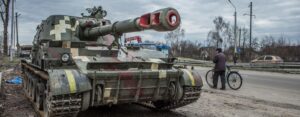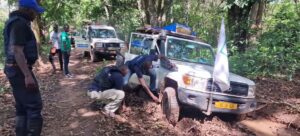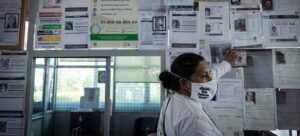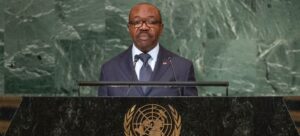“I’m in Kyiv, ending a fast-paced visit to IOM operations in Ukraine and Moldova.
Sirens awoke me, and I was rushed to a bunker in my hotel. Yes, I was scared, but that’s not why I’m writing this. I now have a glimpse into what millions of Ukrainians, and all of my staff here have had to endure for 18 months.
When I got the all-clear I was deeply saddened to learn that two people died in this attack: two more lives cut short, more families with empty places at their tables.
While this might not always feel quite like the capital of a country at war, its shadow is always present. From my journey from Moldova to Odesa, traveling through fields of wheat and sunflowers to Kyiv, I see how war has changed Ukraine and its people.
Commitment to recover
You have to see Ukraine to truly understand what its people have endured, and while I have not been to the scarred east, nor to benighted Mariupol, what I have seen and heard over the past few days has left me in awe of the country’s commitment to recover and to develop.
In the cities in Poland, in the new businesses that Ukrainians are starting in Moldova, at my meetings with communities and officials in Moldova and Ukraine, I have heard one word over and over: Recovery.
That is a testament to the inner strength of a people who have lived – are living – through the horrors of war. It also speaks to the resolve of the international community and to multilateralism.
We have pledged not to forget Ukraine. We have pledged to help the country and its people to rebound.
More than 4.7 million Ukrainians have returned to their homes, one million of them from abroad. They know where they feel at home, and they want to be in control of their futures.
And we are helping them do just that. Over five million people have been directly assisted by IOM, with food, water, healthcare, shelter, cash grants, mental health support, and – crucially – shelter, including home repairs.

‘It’s about people’
As we entered Kyiv from Odesa, we stopped at Bila Tserkva, which came under heavy attack last year. We saw how IOM and our international partners have rehabilitated a water station serving 250,000 people, as well as repairing damaged sewage and heating facilities.
It is work like that which will help Ukrainians face the upcoming winter with a glimmer of confidence.
And we visited the local hospital, also heavily damaged in aerial attacks. It is one of 463 key infrastructure buildings that IOM has helped to renovate.
But, recovery is about more than bricks and mortar and pipes and wires.
It’s about people.
In Bila Tserkva, our programmes are providing grants to hairdressers and beauticians, tailors, accountants, and baristas. We are helping people get back to work, today, and giving them hope for a brighter tomorrow.
Our business grants programme has supported 500 small and micro-enterprises that were affected by the war and helped them retain over 4,000 working places and create more than 1,700 new jobs.
We also help people in Ukraine heal their invisible wounds by overcoming stigma related to seeking mental health support, individual counselling, and community-based psychosocial activities, and by tutoring local mental health practitioners.

‘This war has united us as never before’
I’m also thinking about the more than half a million non-Ukrainians who had to leave after the invasion and who are spread all over Europe, all over the globe.
They were students, labour migrants, entrepreneurs, and people in search of a better life. They, and people like them, will play a huge part in the rebuilding and redevelopment of Ukraine, when the war ends, as end it must.
As I was sitting in the bunker waiting for the all-clear, the words of a young mother, a Ukrainian refugee I met in Moldova, at the start of my journey rang in my ears: ‘This war has united us as never before. I never would have believed just how strong our bonds are, how much we want to help one another.’
There are huge challenges, and there will be more lives lost, more communities devastated, and still millions of people will be working tirelessly to improve the future of their families and support the recovery of their country. We know that. That is why we stay. That is why I am here.”
Learn more about how IOM is helping the people of Ukraine here.










